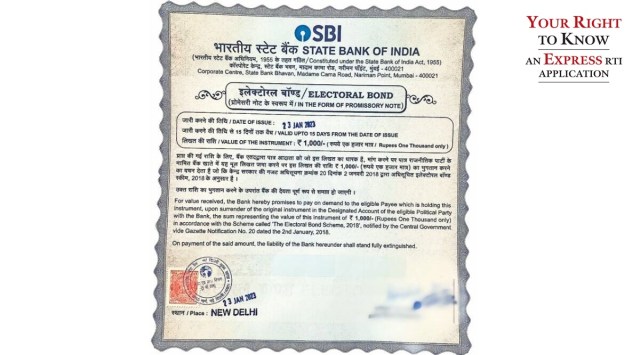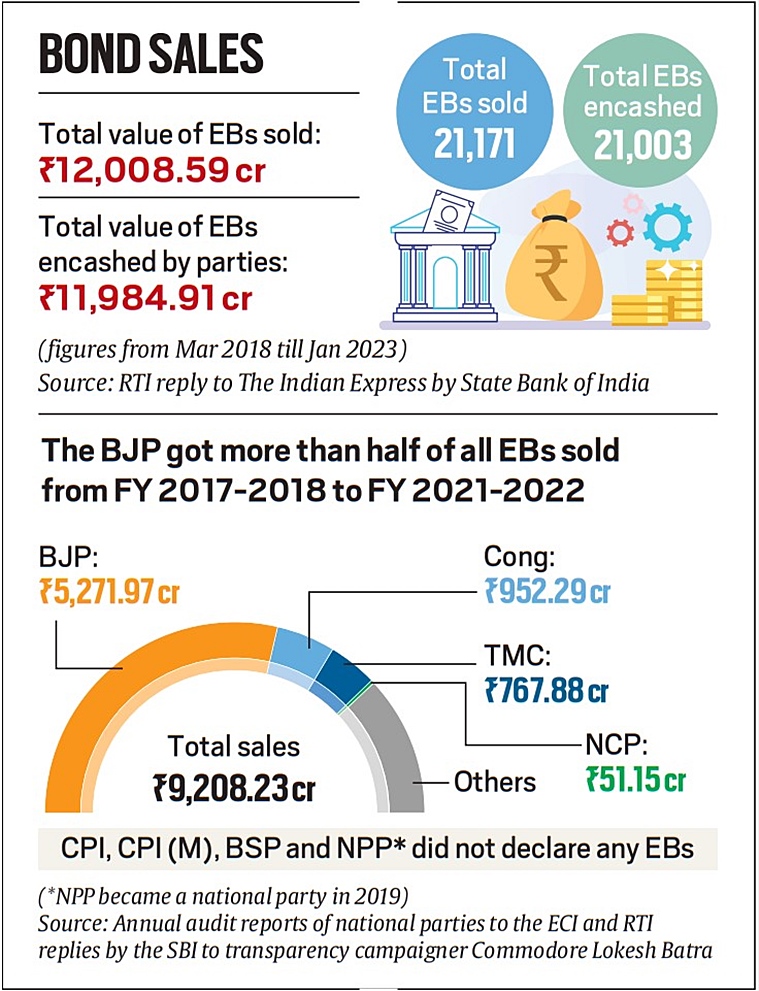A security guard tries to help, pointing to the sixth floor of the building that houses “government business”. On the sixth floor, where the NRI section is marked, there is again no sign indicating where EBs are sold in the open-plan office. Employees point to the desk of the official authorised to issue EBs.

The SBI’s New Delhi main branch is one of the 29 branches of the bank across the country authorised to sell EBs — five years ago, the sale window for the first tranche opened in March 2018.
Story continues below this ad
So when the bank announced the sale of the 25th tranche of EBs from January 19 to January 28 this year, I decided to buy a bond of Rs 1,000 — the smallest denomination available under the government’s Electoral Bond Scheme, 2018 — on January 23.
 Total number of electoral bonds sold since first first tranche opened in March 2018.
Total number of electoral bonds sold since first first tranche opened in March 2018.
According to a Right to Information (RTI) reply by the SBI to The Indian Express on February 15, my EB was among the 97 bonds of Rs 1,000 denomination sold so far. A total of 21,171 bonds have been purchased since the first tranche was sold on March 1, 2018, and the scheme has facilitated the donation of over Rs 12,008.59 crore to political parties through anonymous donors.
RTI replies on the denominations of the bonds sold said the largest denomination available, Rs 1 crore, was by far the most popular. Since the scheme does not allow disclosure of the identity of buyers, one can only assume that the “most popular” bond is being bought by wealthy individuals or large companies.
At the bank, the official asked for a list of documents necessary to successfully apply for an EB – the completed application form and pay-in slip downloaded from the SBI’s website, proof of online payment of the amount in the form of a bank statement with my name on it, Aadhaar card and PAN card.
Story continues below this ad
The payment is made through SBI’s website (onlinesbi.sbi) under the remittance section on the electoral bond tab. After feeding the name of the branch, bond amount and mobile number, an OTP is generated. Using that OTP, a virtual account number (VAN) is generated, along with an Indian Financial System Code (IFSC).
The VAN and IFSC are used to make the transfer from one’s own online banking portal or app. Once the payment is made, a “TB reference number” is generated and one has to print a receipt from the SBI site. Now, ideally this process should be completed before reaching the branch. However, this was not explained on the SBI website, including in the document checklist for buyers.
At the branch, the official concerned explained these steps and left me to complete the process using mobile banking. The official remarked that most buyers are repeat visitors and familiar with the process, so they don’t have to wait. With the SBI site timing out several times, it took about an hour to complete the payment of Rs 1,000.
That done, I was asked to move to a separate room at the back of the main floor dedicated to EB sales. The official said this was to maintain the secrecy of the buyer, even from other officials at the bank.
Story continues below this ad
The scheme allows any Indian citizen, company, partnership firm, trust or unincorporated association or body of individuals to buy an EB to donate anonymously to political parties. It is believed that most EBs are purchased by large corporations.
I could not help but notice the CCTV camera facing me as I sat down.



 Total number of electoral bonds sold since first first tranche opened in March 2018.
Total number of electoral bonds sold since first first tranche opened in March 2018.






